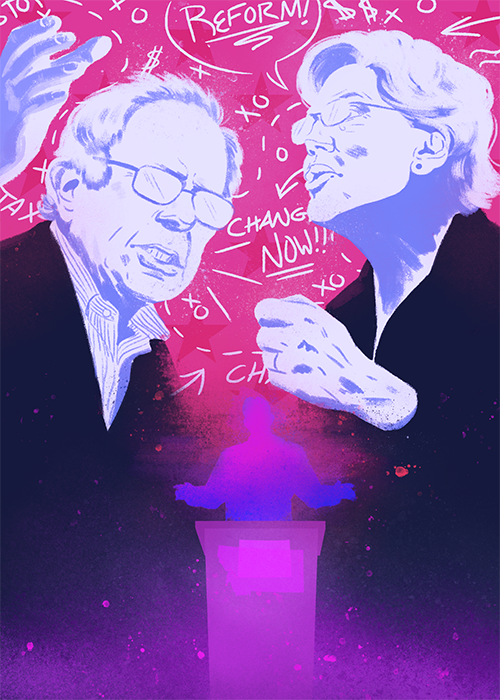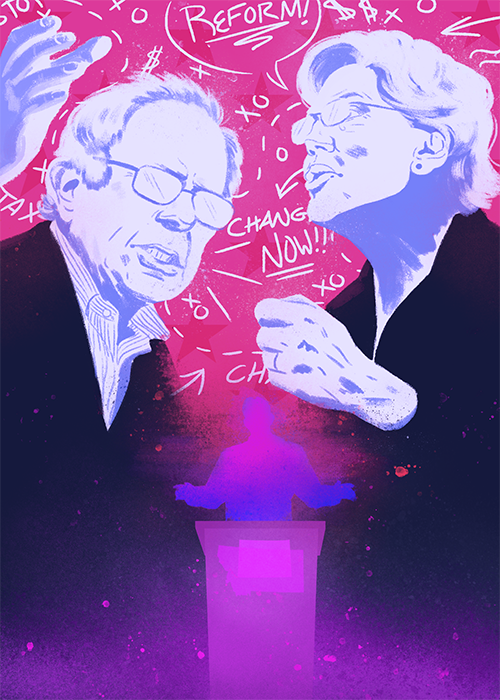
As the fight for the 2020 Democratic nomination ramps up, a fundamental question remains about the party’s messaging: Do bold progressive ideas or consensus-based proposals stand the best chance of taking down President Donald Trump?
While it’s tempting to point to vocal leftist candidates, the swing voters who drive national races tend to prefer moderate voices, said Caroline Heldman, a politics professor at Occidental College and executive director of The Representation Project.
“This is a classic tension — that primary voters are more extreme in both the Republican and Democratic Party, so they tend to select candidates who are more extreme than voters in the general election,” Heldman said.
Once through the primaries, however, nominees must be able to appeal to a bigger swath of the American electorate. In the Democratic debates held July 30-31, a triumvirate from the Mountain West — Montana Governor Steve Bullock, former Colorado Governor John Hickenlooper, and Colorado Senator Michael Bennet — definitively fell into the centrist camp, with policy suggestions tempered by frequent appeals to realism. All three want to shore up health care; none supports Medicare for All. Bennet argued with Kamala Harris over whether crossing the border without documentation should be a criminal offense (he thinks it should); Hickenlooper castigated candidates for supporting the Green New Deal.
If Democratic primary voters are looking for a candidate that can attract the middle-American, working class, white demographic — which some argue is the key to winning in 2020 — the candidates from the Mountain West would seem to be good options. Bullock, for instance, won reelection the same year Trump captured 56 percent of the vote in his state, and Hickenlooper was known for forging alliances with Colorado’s business and oil-and-gas community.
These Westerners, however, are barely registering in polls dominated by well-known figures such as former Vice President Joe Biden and senators Elizabeth Warren and Bernie Sanders. They face a distinct political disadvantage, analysts say, and all three campaigns may be on their final ropes.
“I think that voters, especially when we’re thinking Democratic primary voters, their number-one priority is defeating Donald Trump, period,” said Rick Palacio, managing partner at The Majority Institute, a Denver-based political consulting group. “And oftentimes, the candidates from the West, whether it be Governor Bullock or Governor Hickenlooper … they have not had the national stage the way that a lot of our United States senators have had.”
The U.S. has never had a president who hailed from the Interior West. It’s come close, though, as John Zaller, a political science professor at the University of California, Los Angeles, is quick to point out. Arizona’s John McCain and Mitt Romney, now a Utah senator, both captured the Republican nomination on platforms far more centrist than Donald Trump’s 2016 campaign, but eventually lost to Barack Obama in 2008 and 2012, respectively.
Bullock, Hickenlooper, and Bennet are taking a similar strategy in a primary field overflowing with not only more diverse candidates, but also fellow white, male centrists — namely Biden — who command much bigger platforms. But their experiences in Western states where voter demographics and political attitudes are in the midst of shifting could offer a happy medium for a Democratic party undergoing the typical primary-season splintering.
Take gun control, for example. Two high-profile mass shootings have taken place since last week’s debates; another occurred days prior. Accordingly, fervor for stricter gun laws is building, and the issue could remain top-of-mind for voters in 2020. Most Western states, Colorado and Montana included, have strong ties to gun culture, but Hickenlooper and Bullock have found ways to straddle the line on this sensitive issue.
Hickenlooper signed off on magazine limits and universal background checks as governor of the state where conversation-changing mass shootings at Columbine High School and an Aurora movie theater took place. His campaign has been vocal on the need to curb gun violence, calling for tighter national gun standards.
Bullock’s most poignant debate moment centered on gun control. “Like 40 percent of American households, I’m a gun owner; I hunt,” he said. “Like far too many people in America, I’ve been personally impacted by gun violence. Had an 11-year-old nephew, Jeremy, shot and killed on a playground.”
The comment echoed one made in 2018, when the Montana governor voiced support for a ban on some semiautomatic weapons in the wake of the Parkland, Florida, school shooting. But, as he did this year, Bullock was careful then to exclude single-action hunting rifles from the proposal. (The state legislature did not introduce any such legislation.)
Bullock, some argue, fared best among the Mountain West three during the July debates. “[Bullock] has a variety of interesting attributes (electability, executive experience, a mix of moderation and economic populism) that differentiate him from the field,” wrote Nate Silver, founder of analysis site FiveThirtyEight. “[H]e’s going to have to find some way to command attention in what could be a slow period for the campaign.”
The Interior Western voting bloc may be smaller than the population hubs on the coasts, but success here could portend success in 2020. For one, the Mountain West is becoming more diverse, with Generation Z coming of age in the region’s fast-growing cities and an increasing share of Latinx voters. Furthermore, Western Democrats tend to be, as Palacio said, “libertarian at heart” and centrist — or even right-leaning — on fiscal policy, yet socially liberal.
“At the very heart of us, we’re pragmatists,” Palacio said.
Having Western voices in the national conversation is, of course, important for Western citizens. Climate change, for instance, affects the Interior West differently than it does coastal residents.
“In the [Mountain] West, climate change means rising temperatures, drier for us, unhealthy for us, and oftentimes wildfires that are out of control or unmanageable,” Palacio said. “I think that is a necessary perspective that these Western governors are bringing to the stage.”
The candidates’ window to convince non-Western voters of their ability to bridge the gap between conservatives and liberals, however, is rapidly closing. National polls show that Bullock is favored by 0.7 percent of voters and Bennet 0.3 percent; Hickenlooper is pulling zeroes. Their fundraising sums are paltry, too. Biden reported $22 million in campaign contributions in the second quarter; Bennet, the highest-raising Mountain West candidate, pulled in $2.8 million.
Following the July debates, The Denver Post reported Hickenlooper’s campaign is “on pundits’ death watch” thanks to a potentially lethal combination of fundraising issues, low polling numbers, and a general failure to stand out. Even in Colorado, folks are urging Hickenlooper to abandon the presidential bid and run for Senate. As of Thursday, eight candidates had qualified for the September debate — Bullock, Hickenlooper, and Bennet were not among them.
But voters aren’t necessarily going to flock to the left. “Democratic primary voters, who are more to the left than Democrats and independents in the general election, are playing it safe in order to beat Trump,” Heldman said — they’re just doing so, at least right now, by supporting Biden.
But Palacio cautioned against writing off the Mountain West trio. For one, he said, unknowns at the beginning of a race have a way of making themselves known later, and a little money can go a long way. “It’s going to be a long process, and really, what this is going to come down to is whether or not these candidates can raise the money to stick with it and stay in the race until they get to Iowa, New Hampshire, and South Carolina,” he said.
The issues could work in their favor, too. “It’s about education and health care and keeping our kids safe in school and climate change,” Palacio said. “Those are all things that are incredibly important to primary voters right now.” They’re also things that Westerners, with their cultural practicality, could excel at delivering — if they can manage to make themselves heard.

